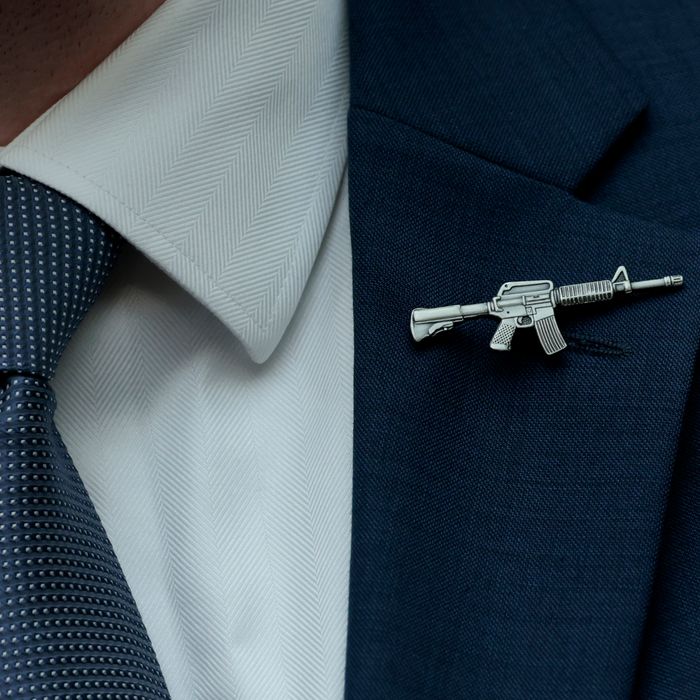
In a 50-50 Senate where filibuster fanatic Joe Manchin controls much of the agenda — and where one of the two parties involved isn’t generally interested in legislating — it’s never smart to count on any bill actually becoming law, unless it’s an infusion of aid to Ukraine or perhaps the renaming of a post office.
Getting one’s hopes up about gun legislation is especially unwise. Almost a decade ago, in the wake of the Sandy Hook massacre, it briefly seemed likely that Congress would do something in the face of such unprecedented horror. But a modest background-check bill sponsored by Manchin and Republican Pat Toomey died via filibuster when 42 Republicans (and four Democrats no longer in the Senate) voted against it. And then, the GOP paid the steep electoral price of … easily winning back control of the Senate in 2014. The episode proved beyond doubt that the core modern Republican position on guns — almost no compromising, even on provisions that a vast majority of Americans claim to support — made plenty of political sense. And it’s generally the same playbook the GOP has followed in Congress followed after the many other high-profile mass shootings of the last decade, from Las Vegas to Parkland to El Paso: Wait out the brief spike in anti-gun fervor, gently pivot back to the status quo. Congress hasn’t passed major gun legislation since 1994, when Republicans were far more flexible on the issue. So after the massacre at Robb Elementary School, it seemed inevitable that the federal response would follow the same infuriating pattern of futility as always.
And yet, whether it’s because the drumbeat of mass shootings has become so deafening, or because Republicans fear that guns might actually galvanize Democrats just months from the midterms, something does maybe possibly seem different this time. The only metric that really matters for evaluating such a claim is enthusiasm from Republican leadership to get something done. And on that score, things are looking cautiously optimistic. Senate Minority Leader Mitch McConnell tapped Texas Senator John Cornyn to lead negotiations with a bipartisan group of senators, thus giving his tacit approval to at least the possibility of a deal. Cornyn is hardly a moderate on guns; he has already promised that what he deems restrictions on the Second Amendment are “not gonna happen.” But Cornyn did work with Chris Murphy — the Connecticut Democrat who has made gun reform his signature issue post-Sandy Hook — on a small fix to the (inadequate) background-check system in 2017, which became law, and has co-sponsored other, similar small-bore background-check bills. And he appears to be making more than a token effort here.
Cornyn told Politico that doing nothing in response to Uvalde “would feed the narrative that we can’t get things done in the public interest.” NBC News reported last week that the group, which includes Manchin, Toomey, Murphy, Coons, and several others — has splintered off into smaller working subsections, focusing on areas of concern that include red-flag laws, which seem likely to figure into any eventual bill, as well as expanded background checks and mental-health provisions. Various members have sounded optimistic, if vague, notes about the progress made so far. Murphy tweeted that “there is growing momentum to get something done,” and Republican Susan Collins said, “We are making rapid progress toward a common sense package that could garner support from both Republicans and Democrats.” (Okay, maybe she’s not the most reliable oracle.)
There are massive caveats here. If a passable bill emerges from this group, it is still likely to be a very incremental change and inherently unsatisfying to those continually aghast at America’s gun-violence epidemic. A ban on AR-15-type rifles is off the table. Ammunition limits are off the table. Even universal background checks are probably off the table.
And it is quite likely that the talks will end in complete failure again, as Murphy conceded to CNN. Republicans, including former president Trump, have expressed fleeting interest in gun reform several times over the last few years, usually in the immediate aftermath of a mass shooting, only to retreat from their positions shortly afterward in the face of unified opposition from their base. If Republicans needed new justification to revert to their usual stonewalling, they need only look at what happened to Republican congressman Chris Jacobs, who two weeks ago came out in favor of an assault-weapons ban — and last week announced he wouldn’t run for reelection amid the blowback from his party.
Yet the bar for progress is so low, and the intractable scourge of gun violence such an urgent problem to address, that any movement feels significant — and right now, even the perception that change might be in the air feels refreshing. On Thursday night, President Biden, who has perhaps wisely taken a back seat in the Senate negotiations, pleaded for legislative action on national TV. “Enough,” he said. Maybe enough Senate Republicans are thinking similarly. Maybe the eternal cries of “do something!” will actually be met with … something. That’s about the best we can expect from the federal government right now.































